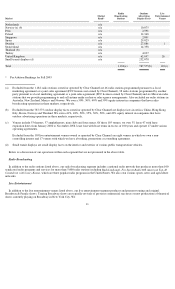iHeartMedia 2003 Annual Report Download - page 21
Download and view the complete annual report
Please find page 21 of the 2003 iHeartMedia annual report below. You can navigate through the pages in the report by either clicking on the pages listed below, or by using the keyword search tool below to find specific information within the annual report.
Antitrust Regulations May Limit Future Acquisitions
Additional acquisitions by us of radio and television stations, outdoor advertising properties and live entertainment operations or entities
may require antitrust review by federal antitrust agencies and may require review by foreign antitrust agencies under the antitrust laws of
foreign jurisdictions. We can give no assurances that the Department of Justice or the Federal Trade Commission or foreign antitrust agencies
will not seek to bar us from acquiring additional radio or television stations or outdoor advertising or entertainment properties in any market
where we already have a significant position. Following passage of the Telecommunications Act of 1996, the DOJ has become more
aggressive in reviewing proposed acquisitions of radio stations, particularly in instances where the proposed acquiror already owns one or more
radio station properties in a particular market and seeks to acquire another radio station in the same market. The DOJ has, in some cases,
obtained consent decrees requiring radio station divestitures in a particular market based on allegations that acquisitions would lead to
unacceptable concentration levels. The DOJ also actively reviews proposed acquisitions of outdoor advertising properties. In addition, the
antitrust laws of foreign jurisdictions will apply if we acquire international broadcasting properties.
Environmental, Health, Safety and Land Use Laws and Regulations May Limit or Restrict Some of Our Operations
As the owner or operator of various real properties and facilities, especially in our outdoor advertising and live entertainment venue
operations, we must comply with various foreign, federal, state and local environmental, health, safety and land use laws and regulations. We
and our properties are subject to such laws and regulations relating to the use, storage, disposal, emission and release of hazardous and non-
hazardous substances and employee health and safety, as well as zoning and noise level restrictions which may affect, among other things, the
hours of operations of our live entertainment venues. Historically, we have not incurred significant expenditures to comply with these laws.
However, additional laws, which may be passed in the future, or a finding of a violation of or liability under existing laws, could require us to
make significant expenditures and otherwise limit or restrict some of our operations.
Government Regulation of Outdoor Advertising May Restrict Our Outdoor Advertising Operations
The outdoor advertising industry that operates domestically is subject to extensive governmental regulation at the federal, state and local
level. These regulations include restrictions on the construction, repair, upgrading, height, size and location of and, in some instances, content
of advertising copy being displayed on outdoor advertising structures. In addition, the outdoor advertising industry that operates in foreign
countries is subject to certain foreign governmental regulation. Compliance with existing and future regulations could have a significant
financial impact.
Federal law, principally the Highway Beautification Act of 1965, requires, as a condition to federal highway assistance, states to implement
legislation to restrict billboards located within 660 feet of, or visible from, highways except in commercial or industrial areas and requires
certain additional size, spacing and other limitations. Every state has implemented laws and regulations in compliance with the Highway
Beautification Act, including the removal of any illegal signs on these highways at the owner’s expense and without any compensation. Federal
law does not require removal of existing lawful billboards, but does require the payment of just compensation if a state or political subdivision
compels the removal of a lawful billboard along a federally aided primary or interstate highway. State governments have purchased and
removed legal nonconforming billboards in the past, using a portion of federal funding and may do so in the future.
States and local jurisdictions have, in some cases, passed additional regulations on the construction, size, location and, in some instances,
advertising content of outdoor advertising structures adjacent to federally-aided highways and other thoroughfares. From time to time
governmental authorities order the removal of billboards by the exercise of eminent domain and certain jurisdictions have also adopted
amortization of billboards in varying forms. Amortization permits the billboard owner to operate its billboard only as a non-conforming use for
a specified period of time, after which it must remove or otherwise conform its billboard to the applicable regulations at its own cost without
any compensation. Several municipalities within our existing markets have adopted amortization ordinances. Restrictive regulations also limit
our ability to rebuild or replace nonconforming billboards. We can give no assurance that we will be successful in negotiating acceptable
arrangements in circumstances in which our billboards are subject to removal or amortization, and what effect, if any, such regulations may
have on our operations.
21
























